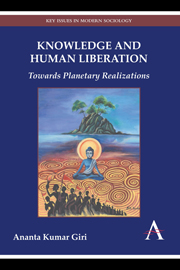Book contents
- Frontmatter
- Contents
- Preface
- Acknowledgments
- Foreword
- Introduction: The Calling of Transformative Knowledge
- Part I Nurturing the Garden of Transformational Knowledge: Roots and Variants
- 1 Knowledge and Human Liberation: Jürgen Habermas, Sri Aurobindo and Beyond
- 2 Beyond West and East: Co-evolution and the Calling of a New Enlightenment and Non-duality
- 3 The Modern Prince and the Modern Sage: Transforming Power and Freedom
- 4 Kant and Anthropology
- 5 Tocqueville as an Ethnographer of American Prison Systems and Democratic Practice
- Part II Rethinking Knowledge
- Part III Aspirations and Struggles for Liberation: Towards Planetary Realizations
- Afterword
- Advance Praise
2 - Beyond West and East: Co-evolution and the Calling of a New Enlightenment and Non-duality
from Part I - Nurturing the Garden of Transformational Knowledge: Roots and Variants
Published online by Cambridge University Press: 05 May 2013
- Frontmatter
- Contents
- Preface
- Acknowledgments
- Foreword
- Introduction: The Calling of Transformative Knowledge
- Part I Nurturing the Garden of Transformational Knowledge: Roots and Variants
- 1 Knowledge and Human Liberation: Jürgen Habermas, Sri Aurobindo and Beyond
- 2 Beyond West and East: Co-evolution and the Calling of a New Enlightenment and Non-duality
- 3 The Modern Prince and the Modern Sage: Transforming Power and Freedom
- 4 Kant and Anthropology
- 5 Tocqueville as an Ethnographer of American Prison Systems and Democratic Practice
- Part II Rethinking Knowledge
- Part III Aspirations and Struggles for Liberation: Towards Planetary Realizations
- Afterword
- Advance Praise
Summary
In [On the Origin of Species], Darwin had touched only incidentally on man, yet as a man, he placed himself – the observing scientist – outside the spectacle of nature. His own absolute superiority (and by extension, that of his kind) vis-à-vis the rest of the animal kingdom he never thought to question… In writing the Descent of Man, Darwin relinquished his stand outside the world and took up a position right inside it… Rather than taking for granted the preeminence of rational man (as a precondition for engaging in scientific inquiry), the question became: How did he get there?
—Tim Ingold, Evolution and Social Life (1986, 48–9)The classical dichotomies between internal and external, organism and environment, face radical questions. Why must we think that one of the two polarities plays an active role (as cause), and the other plays a passive role (as environment)…and the organisms are nothing but objects this force plays upon?… Living systems are not collections of traits or characteristics that are passively subject to direction imposed on them by various environmental forces. They are autonomous and active entities that themselves contribute to the creation and modulation of these forces. evolution is always a co-evolution.
—Gianluca Bocchi and Mauro Ceruti, The Narrative Universe (2002, 159–60)…the criteria of enlightenment and emancipation are themselves evolving as part of the evolutionary process… since evolution is an open-ended process, awakening, realization or enlightenment need to be relativised and conceived as in principle subject to evolution, so that they cannot be identified for any being or specific species in an absolute manner.
—Roy Bhaskar, Meta-Reality: The Philosophy of Meta-Reality. Vol. 1: Creativity, Love and Freedom (2002, 25–6)- Type
- Chapter
- Information
- Knowledge and Human LiberationTowards Planetary Realizations, pp. 51 - 70Publisher: Anthem PressPrint publication year: 2013

